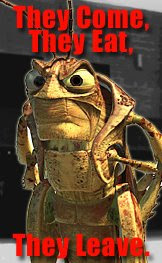Jude 1:12 “They are clouds without water, carried about by the winds; late autumn trees without fruit…”
Jude’s letter to the church is the shortest, but perhaps the most potent in the entire New Testament. In it, he contends for the faith once delivered to the saints and admonishes the church in regards to certain individuals that have crept into the church unnoticed. Incredibly, his warning is just as relevant today as it was over 1900 years ago.
 Several years ago, I took my then small children to a Pixar movie called “A Bug’s Life.” It was a cute animated film about life in a community of ants. Solomon said that we should learn from the way of the ants and get wisdom (Proverbs 6:6). So, I thought, maybe I would learn something from this kid’s movie – and boy, did I ever.
Several years ago, I took my then small children to a Pixar movie called “A Bug’s Life.” It was a cute animated film about life in a community of ants. Solomon said that we should learn from the way of the ants and get wisdom (Proverbs 6:6). So, I thought, maybe I would learn something from this kid’s movie – and boy, did I ever. The ants were busy working, harvesting and storing food in their colony when they were interrupted by a horde of grasshoppers that had come to steal the food from them. The grasshoppers had no intention of working, helping or being a part of the colony. They simply came to get what they could before they moved on to the next stop. The movie tagline was unforgettable to me; “They come, they eat, they leave.”
Jude was writing to the “colony” of believers – the church. He was warning them about a new danger in, and to, the church: the “grasshopper” Christian (note: I use the term “Christian” in the most liberal sense). Among many other metaphors, he called them “a spot on your love feast.” They come, they eat, they leave. Except it’s not that simple. They don’t help the colony. They damage the colony. They tear-up the colony. They injure the good ants that reside there. Unfortunately, when they leave the colony – and leave they will – they leave carcasses strewn in their wake.
One of the marks of the “grasshopper” Christian is that they
 “reject God’s authority” (verse 8). They listen, but they do not hear. Rather than believe and receive, they pretend and offend. As soon as they hear something they do not like, they reject the message and messenger. Either in ignorance or insolence, they are not afraid to speak against Pastors, church leaders, or other Christians.
“reject God’s authority” (verse 8). They listen, but they do not hear. Rather than believe and receive, they pretend and offend. As soon as they hear something they do not like, they reject the message and messenger. Either in ignorance or insolence, they are not afraid to speak against Pastors, church leaders, or other Christians.Then as quickly as they came, they leave the colony -- with their full-bellies and empty-spirits -- loudly proclaiming to any and all who will listen, “I’m not being fed!”
Jude called the grasshopper-types “waterless clouds, fruit-less trees, and wandering stars.” They have the appearance of a Christian, but it is only an appearance. It is the back-lot at Universal Studios. It is a facade. These are persons who “cause divisions, not having the Spirit.” Jude warns the church to beware of them. They are destroyers, not builders. Beware, indeed – for their end is “the blackness of darkness forever” (verse 13).
In spite of the sneak attack and eventual exit of the grasshoppers, the colony continues on. It repairs the breaches to the body. It soothes and bandages the wounds. It picks up the pieces and rebuilds. It knows its mission and continues once again in fulfilling its God-given purpose.
The grasshoppers come and the grasshoppers go, but the colony – just like the one who established it – lives on.
God never intended us to be like the nomadic grasshoppers. Rather, we are called by God to be like the ants in the colony. Living, working and thriving for the good of the church, the glory of God, and the benefit of others. We are a part of God's divine design -- created for good works in Christ. We have been placed here to help God, help the church, help others and, in doing so, help ourselves.
The wisest man who ever lived said it; "Consider the ant."

